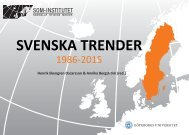1Akq4ev
1Akq4ev
1Akq4ev
Create successful ePaper yourself
Turn your PDF publications into a flip-book with our unique Google optimized e-Paper software.
On the question of mixing religion with politics, Muslims in the United States aredivided, much like the general public. About four-in-ten (43%) say that mosques should expresstheir views on social and political matters, while a slightly larger share (49%) say that mosquesshould keep out of political matters. On this question, there are substantial differences betweennative-born and foreign-born Muslims. Native-born Muslims express overwhelming support forthe notion that mosques should express their views on social and political matters. By contrast, alarge majority of foreign-born Muslims – many of whom come from countries where religionand politics are often closely intertwined – say that mosques should keep out of political matters.Compared with the general public, Muslims are somewhat less engaged in politicalmatters. In part, this is because many Muslim immigrants are not citizens of the United States,and thus are not eligible to participate in elections. But even among those eligible to register andvote, Muslims are somewhat less likely than the public as a whole to do so.Party Affiliation and Views of BushWhen asked about their general outlook on politics, 38% of Muslim Americans describetheir political views as moderate; a quarter describe themselves as liberal, while 19% describethemselves as conservative. U.S. Muslims, considered as a whole, are much less likely than thegeneral population to describe themselves as political conservatives.Overall, 63% of Muslims are Democrats(37%) or say that they lean toward theDemocratic Party (26%). Only about one-in-ten(11%), by contrast, are Republicans orRepublican leaners, with the remainder (26%)unaffiliated with either political party.Democratic affiliation is much higher amongMuslims than it is among the public as a whole:about half of Americans (51%) identifythemselves as Democrats or lean Democratic.Republican affiliation is much lower amongMuslims than among the general public (11% vs.36%).Political ideology, which is closely linkedto partisanship among the public as a whole,seems to have less of an impact on MuslimParty AffiliationRep/ Dem/ Ind,lean R lean D no leaning% % %All U.S. Muslims 11 63 26=100Conservative 25 60 15=100Moderate 9 72 19=100Liberal 10 81 9=100Native-born 7 78 15=100African American 4 78 18=100Other 10 78 12=100Foreign-born 15 57 28=100Arrived pre-1990 12 73 15=1001990 or later 17 51 32=100U.S. general public* 36 51 13=100Conservative 61 31 8=100Moderate 31 56 13=100Liberal 11 81 8=100*Based on national surveys January-March 2007 by thePew Research Center for the People & the Press.Americans. Even among those Muslims who describe their political views as conservative, alarge majority (60%) aligns with the Democratic Party while only 25% identify with the42 MUSLIM AMERICANS



